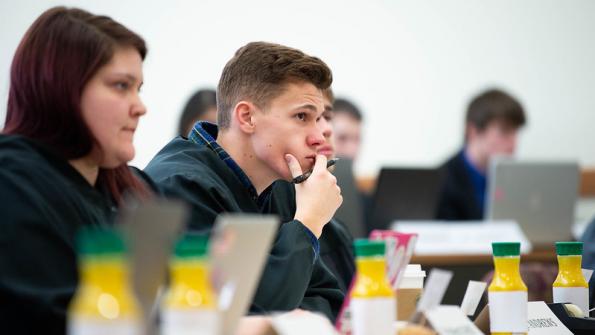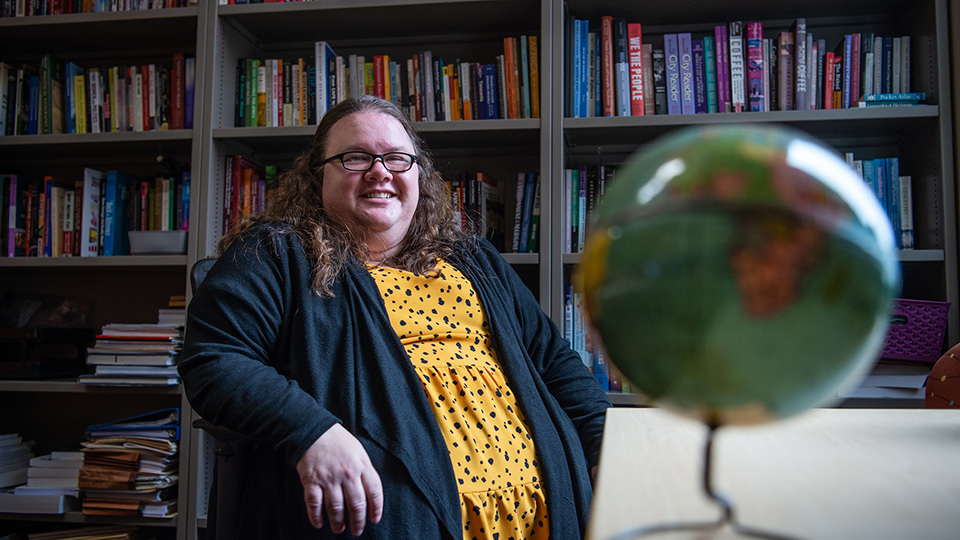Angela Subulwa is a few weeks into her first semester as director of the International Studies program at the University of Wisconsin Oshkosh. While having taken on a new role, Subulwa is far from a UW Oshkosh newcomer. She’s been a part of the geography department since 2008 and, from 2018 until her recent change, served as department chair. During her dozen years at UWO she’s taught courses that count in several other interdisciplinary programs, including International Studies (IS), Women’s and Gender Studies, African American Studies and Social Justice.
Now she steps into the role last held by the late Kenneth Grieb, who died in 2018 after more than 50 years with the University, to steer a program with an extra layer of significance given current events. (Associate political science professor Tracy Slagter was interim IS director in the meantime.)
“If we learned anything by the current global pandemic, it is that we are not an island and that we are more connected to people and places across the world than many realized,” Subulwa said. “A degree in international studies prepares Titans to not only understand such pressing global issues but also to respond and to act in globally responsible ways.”
To help welcome Subulwa to her new position, we caught up with the Sioux City, Iowa native to talk about the IS program, what draws students to it and her plans for the future.
What draws students to the field of international studies?
Many students are initially drawn to international studies because of a curiosity about places beyond themselves and then they begin to realize how connected these seemingly beyond places actually are to our daily lives. Students are also drawn to the interdisciplinary approach that is foundational to international studies as it allows them to build on their own interests or strengths and/or pair international studies with other majors and minors.
That interdisciplinary approach to international studies includes courses from several departments. Why is that approach significant?
The interdisciplinary approach to International Studies is central to the program and comes from a recognition that multiple disciplinary perspectives are necessary to understand and unpack complex global issues. This approach also provides students with exposure to different ways to handle challenges and answer complicated questions.

Students in an international law class take part in a moot court simulation in 2018.
Why does involvement in Model United Nations (MUN) enhance a student’s experience at UWO?
MUN offers the opportunity for any UWO student to enhance their academic and professional skills, while building and joining one of the strongest networks of support (professionally and personally) on campus and beyond. It also is for all UWO students—from any major, any college and any campus—not only international studies students.
Through MUN, students conduct research and share information on global issues while developing detailed knowledge of the nations they will represent at competitions. The skills built through participation in MUN are highly transferable skills—into the classroom and the workplace.
What are your goals for the department for your first year as director?
My initial goals are to spend time gaining more familiarity with the program’s wide-ranging curriculum and diverse faculty in order to understand all of its strengths and identify opportunities to evolve. In that process I would like to bring more faculty to the table while discussing ways to make room for critical perspectives within the curriculum.
While I will still pursue those goals and conversations, I am also adjusting program priorities in light of our current realities connected to COVID-19. My biggest priority is the mental and physical health, safety and success of International Studies students as they navigate what will be a difficult year. What this looks like is a lot of outreach, small and frequent conversations, and prioritization and intensification of my advising role.
How about long-term goals?
Continue to leverage our many strengths and build links to new faculty, new departments and other colleges. For example, there are clear synergies between IS and other College of Letters and Science programs, such as Environmental Studies, Women’s and Gender Studies, African American Studies, Social Justice, Hmong Studies and Indigenous Studies, that can be explored and developed. Additionally, partnerships with the College of Nursing or the Environmental Health program could lead to a robust concentration in global public health—an arena that I think we can all understand the importance of given the realities of 2020.
Learn more:

